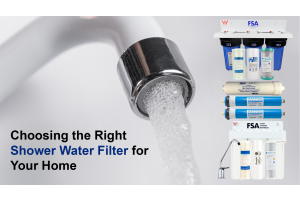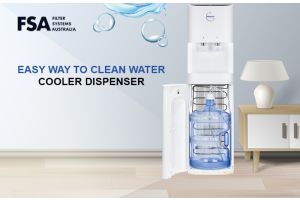
In our pursuit of a healthier lifestyle, it's easy to overlook a crucial aspect of our daily routine – the water we use for bathing. Showering with unfiltered water can expose our skin and hair to an array of contaminants, potentially giving rise to health concerns. This is where the significance of a shower water filter comes into play. These filters act as a barrier against impurities, ensuring that the water we use for bathing is purified and free from harmful substances. However, the abundance of options in the market can make selecting the right filter for one's home a daunting task. The challenge lies in understanding the specific needs of your water quality, considering filtration technologies, maintenance requirements, and other factors to make an informed decision. Taking the time to choose the right shower water filter is a proactive step towards safeguarding our well-being, enhancing our bathing experience, and contributing to an overall healthier lifestyle.
In this guide, we will explore key considerations to help you make an informed decision on selecting the ideal shower water filter for your needs.
Let’s begin!
How Shower Water Filters Work?
Shower water filters operate through various technologies and filtration processes designed to remove impurities and enhance water quality.
Activated Carbon Filtration
Absorption Process: Many shower water filters use activated carbon as a key component. Activated carbon is highly porous and has a large surface area that attracts and absorbs impurities. When water passes through the filter, the activated carbon traps chlorine, volatile organic compounds (VOCs), and other contaminants, preventing them from entering the shower.
Kinetic Degradation Fluxion (KDF) Filtration
Redox Reaction: KDF filters use a redox (reduction-oxidation) reaction to transform contaminants into less harmful substances. Typically made of copper and zinc alloys, KDF media facilitates this reaction when water flows through the filter. It effectively removes chlorine, heavy metals, and inhibits the growth of bacteria and algae in the water.
Vitamin C Filtration
Dechlorination: Some filters utilise vitamin C (ascorbic acid) to neutralise chlorine in the water. Vitamin C reacts with chlorine, converting it into a harmless compound. This dechlorination process is effective in promoting healthier skin and hair by eliminating the drying effects of chlorine.
Infrared Mineral Balls
Ionisation and Activation: Infrared mineral balls, often found in advanced shower filters, emit infrared rays that ionise water molecules. This process helps activate and energise the water, contributing to improved hydration and skin health. Additionally, the mineral balls may release beneficial minerals into the water.
Ceramic Filters
Mechanical Filtration: Ceramic filters are known for their mechanical filtration properties. They have microscopic pores that physically trap sediments, rust, and larger particles in the water. While not as effective against dissolved substances, ceramic filters complement other filtration technologies to enhance overall water quality.
Multiple Filtration Stages
Comprehensive Treatment: High-quality shower water filters often combine multiple filtration stages to address a wide range of contaminants. These stages may include pre-filters to remove larger particles, followed by activated carbon, KDF, and other specialised media to ensure a thorough and comprehensive water treatment.
Bacteriostatic Properties
Bacteria Prevention: Some shower filters incorporate materials with bacteriostatic properties, preventing the growth of bacteria within the filter. This feature contributes to maintaining a clean and hygienic filtration system.
The Benefits of Using a Shower Water Filter
The benefits of using a shower water filter extend beyond mere water purification, encompassing a range of advantages that positively impact both your health and overall showering experience.
- Improved Skin Health: Unfiltered water often contains impurities and harsh chemicals such as chlorine, which can strip the skin of its natural oils, leading to dryness and irritation. A shower water filter effectively removes these contaminants, resulting in softer, more hydrated skin. It helps maintain the skin's natural moisture balance, reducing the risk of dryness, itchiness, and various skin conditions.
- Healthier Hair: Similar to its effects on the skin, unfiltered water can be harsh on hair, causing dryness and dullness. A shower water filter eliminates minerals and chemicals that contribute to hair damage, leaving your hair shinier, softer, and more manageable. By preventing the build-up of impurities on the scalp and hair strands, the filter promotes a healthier and more vibrant mane.
- Reduced Chlorine Exposure: Chlorine is commonly used in water treatment to eliminate bacteria, but prolonged exposure during showers can have adverse effects. A shower water filter plays a crucial role in reducing chlorine levels, minimising the risk of skin and respiratory issues associated with chlorine exposure. This is particularly beneficial for individuals with sensitive skin or allergies.
- Prevention of Respiratory Issues: When chlorine in water vaporises during a hot shower, it can be inhaled, potentially leading to respiratory problems. A shower water filter helps mitigate this risk by removing chlorine and other volatile organic compounds, ensuring that the air you breathe in the shower is cleaner and healthier.
- Enhanced Shower Experience: Beyond health benefits, a shower water filter contribute to an overall enhanced shower experience. The removal of impurities improves water quality, eliminating unpleasant odours and promoting a refreshing and invigorating feel. The filtered water allows for a gentler and more enjoyable cleansing process, turning your daily shower into a more pleasurable and spa-like ritual.
- Long-Term Cost Savings: By preventing the build-up of minerals in your plumbing fixtures and showerhead, a water filter can extend the lifespan of these components. This not only reduces maintenance costs but also ensures that your shower continues to function efficiently over the long term.
Addressing Common Misconceptions about Shower Water Filters
There are several common misconceptions about shower water filters that deserve clarification to ensure consumers make informed decisions about their water purification needs.
Misconception: All Water Filters Are the Same
Clarification: Not all shower water filters are created equal. They vary in terms of filtration technologies, materials, and the contaminants they target. Different filters address specific issues, such as chlorine reduction, heavy metal removal, or overall water purification. It's crucial to choose a filter that aligns with your water quality concerns and needs.
Misconception: Filters Remove Essential Minerals
Clarification: While some filtration methods may reduce mineral content in water, not all filters eliminate essential minerals. Many filters, especially those with activated carbon or ceramic elements, focus on removing impurities while retaining beneficial minerals. The impact on mineral content depends on the specific filter design.
Misconception: Filters Are Only Necessary for Well Water
Clarification: Municipal water sources can also contain contaminants, such as chlorine, chloramine, and sediments. Even if your water comes from a treated municipal supply, a shower water filter can enhance water quality by reducing these additives and impurities, promoting healthier skin and hair.
Misconception: Filters Are Only for Visible Contaminants
Clarification: While some contaminants are visible, such as sediments or particles, others like chlorine are not visible but can still affect your skin and overall health. Shower water filters address both visible and invisible contaminants, providing comprehensive water purification.
Misconception: Filters Are Difficult to Install
Clarification: Many shower water filters are designed for easy installation without the need for professional help. They often come with clear instructions and can be installed by users with basic plumbing knowledge. DIY installation ensures that you can start enjoying the benefits of filtered water promptly.
Misconception: Filters Significantly Decrease Water Pressure
Clarification: High-quality shower water filters are designed to maintain adequate water pressure. While some cheap or poorly designed filters might impact pressure, most reputable filters allow water to flow through efficiently, ensuring a satisfying shower experience.
Misconception: Filters Are Unnecessary for Short Showers
Clarification: The duration of your shower doesn't negate the potential benefits of a water filter. Even in a short period, exposure to chlorine and other contaminants can affect your skin and hair. A shower water filter provides immediate benefits, regardless of the length of your shower.
Misconception: Filters Only Improve Water Quality for Skin
Clarification: While one of the primary benefits is improved skin health, shower water filters also contribute to healthier hair, as they prevent the drying effects of chlorine and other chemicals. Additionally, filtered water can have positive effects on respiratory health, especially for those sensitive to chlorine vapours.
How to Choose the Right Shower Water Filter for Your Home?
Choosing the right shower water filter for your home involves considering several factors to ensure that the filter effectively meets your specific needs.
Here's a step-by-step guide to help you make an informed decision:
- Understand Your Water Quality: Begin by identifying the impurities present in your water. Conduct a water test or research your local water quality reports to determine the specific contaminants, such as chlorine, heavy metals, or sediments, that you want to address.
- Filtration Technology: Research different filtration technologies available for shower water filters. Common types include activated carbon, Kinetic Degradation Fluxion (KDF), vitamin C, and ceramic filters. Understand how each technology works and its effectiveness in removing specific contaminants.
- Filtration Technology: Research different filtration technologies available for shower water filters. Common types include activated carbon, Kinetic Degradation Fluxion (KDF), vitamin C, and ceramic filters. Understand how each technology works and its effectiveness in removing specific contaminants.
- Consider Multiple Filtration Stages: Opt for a shower water filter with multiple filtration stages. Filters that incorporate various technologies provide comprehensive purification, addressing a wider range of impurities and ensuring a higher quality of water.
- Check Flow Rate: Consider the flow rate of the filter. While effective filtration is crucial, it shouldn't compromise the water pressure in your shower. Look for a filter that maintains a balanced flow rate, providing both effective purification and a satisfying shower experience.
- Filter Longevity and Maintenance: Evaluate the lifespan of the filter and the ease of maintenance. Some filters may require more frequent replacement of cartridges, while others may have a longer lifespan. Choose a filter with a reasonable maintenance schedule that aligns with your preferences and convenience.
- Installation Compatibility: Check the compatibility of the filter with your existing shower setup. Some filters are designed for easy DIY installation, while others may require professional help. Choose a filter that suits your technical comfort level and can be seamlessly integrated into your shower system.
- Budget Considerations: Establish a budget for your shower water filter. Prices can vary, but it's important to view this as an investment in your health. Consider the long-term benefits of improved skin and hair health when assessing the overall value of the filter.
- Read Reviews and Ratings: Look for customer reviews and ratings of the shower water filters you are considering. Real experiences from other users can provide insights into the effectiveness, durability, and overall satisfaction with a particular filter.
- Brand Reputation: Consider the reputation of the brand. Established brands with a history of producing reliable water filtration products are more likely to deliver quality and effective shower water filters. Research customer feedback and testimonials related to the brand.
- Warranty and Customer Support: Check the warranty offered by the manufacturer and the availability of customer support. A reliable warranty reflects the manufacturer's confidence in their product, and good customer support ensures assistance in case of any issues or concerns.
Wrapping Up,
Choosing the right shower water filter involves careful consideration of your water quality, filtration technology, maintenance requirements, flow rate, compatibility, and budget. By understanding these key factors, you can make an informed decision that aligns with your specific needs, ensuring a cleaner and healthier shower experience for you and your family. Invest in your well-being by selecting a high-quality shower water filter that provides reliable and effective filtration for your home.
If you are looking to buy the best shower filter in Australia, Filter System Australia is your one-stop shopping destination. Browse through our selection and shop today!



